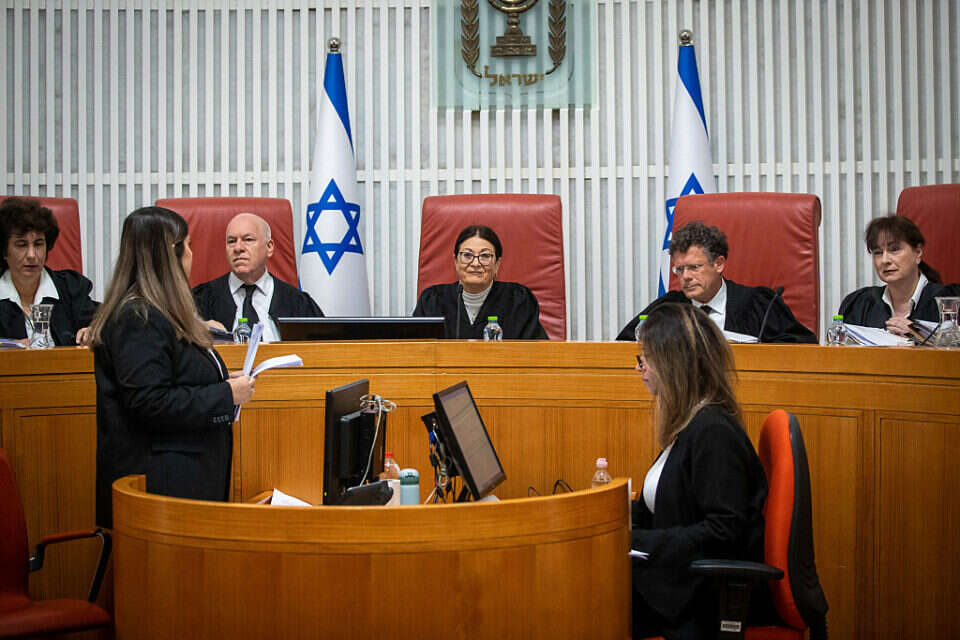The result was not really a surprise.
Big questions that the judges put on the table during the discussion in relation to Deri's statements about "retiring from political life" in the first act, led to the outcome gun firing in the third act.
The judges' avoidance of a decision, at least for the time being, in invalidating the basic law that qualified and paved the way for Deri's appointment was both expected and wise.
The court has already made it clear in the past, and more than once, that invalidating a basic law is an unconventional weapon, which should only be used when there is no other choice.
This is not the current case, where the result could have been reached in other ways as well.
The interesting thing in the 140 pages of the judgment is therefore not the result, but the reasoning and no less than the solid majority in which the decision was made, almost unanimously.
The ten judges of the Supreme Court stood like a wall in the face of the shower of ballistics that was hurled at them in the last few days.
The threats to "eliminate the reason for reasonableness" had no effect either.
Shas activists. The decision is not against them, photo: Yossi Zamir/Flash90
Contrary to widespread claims heard after the publication of the verdict, the court did not rule against hundreds of thousands of Shas voters but in favor of the rule of law. This means that even ten million people are not above the law, and there are basic democratic principles that they have no power to change. The debate therefore does not focus on the questions Numbers, of majority and minority, but in fundamental democratic issues of the limits of the power of the majority and the role of the court in a democratic society.
In this context, and unlike the recognition of the limits of the majority's power, the issue of reasonableness is not simple at all.
First, due to the ambiguity of the "reasonableness test" and its limits.
At the end of the day these are not determined by law, in clear language.
"Likelihood" - and like it the "threshold of the likelihood test", another vague term) - is not based on solid facts that can be verified scientifically.
It is determined according to an objective-normative test, of what is "appropriate" and not necessarily of what is "found".
The court - it and no one else - sets the limits of "reasonable" and "unreasonable", and in light of its determination, the specific act is examined.
The position of the six judges, who thought that Deri's appointment is not included in the "range of reasonableness" (and according to some of them it even "radically deviates from it", again a rather vague test term), shows that their standards in relation to the conditions for a person's eligibility to serve as a minister are very different From those of the hundreds of thousands of Shas voters and most of the politicians who are members of the Israeli Knesset who supported the appointment.
Aryeh Deri after the High Court decision, photo: Oren Ben Hakon
Four judges based their decision on Deri's own words, as part of the hearing on his conviction following the plea deal, during which he stated that he would "retire from political life".
The court made it clear that even in a world as cynical as Israeli politics, "not everything goes."
A statement of this kind, he clarified, cannot be accompanied by a playful wink and interpreted by Umera as retirement for five minutes or a day (at the end of which Deri Kebal already announced with a committee that "he is not going anywhere" and will run in the elections), but as an honest admission that he will not return to the political field.
Therefore, the court ruled, Deri is now 'silenced' from interpreting the statement that formed the basis of the plea agreement and the sentence that was imposed upon him in a different way.
minority opinion
Minority Judge Elron was the only one among the members of the panel who raised a principled flag seeking to set completely different limits to the court's intervention.
Loyal to his long-standing method, he prefers, even if expressing displeasure, to leave the issue of Deri's eligibility to "public law", the elections, and not to "public law" on the grounds of reasonableness.
Indeed, his remaining in a bright minority shows that in the current context, given his specific circumstances, this opinion is not widespread even among judges who tend to identify them as extreme conservatives.
Indeed, even the minority judge did not definitively and absolutely determine that Deri's appointment was part and parcel and could stand permanently, but chose to give it an extension in order to convince the chairman of the election committee that there was no disgrace in his actions.
were we wrong
We will fix it!
If you found an error in the article, we would appreciate it if you shared it with us




/cloudfront-eu-central-1.images.arcpublishing.com/prisa/OCS7V4Q6YKB6UMI76BXPPNGQJE.jpg)




